This lightly sweet mung bean soup recipe is a summer staple in many Chinese families, thought to cool off the excess heat in the body.
We’ve been making it for years and can’t believe it’s taken this long for us to blog it. Today, we’re adding it to our collection of Chinese dessert soups!
What Are Mung Beans?
Even if you haven’t heard of mung beans, you may be surprised to know that you’ve probably eaten them in some form:
- Bean sprouts are sprouted mung beans. (These are the kind without the big yellow bean at the end—those are soybean sprouts.)
- Moong dal, or yellow dal, are split mung beans with the outer husk removed.
- Thin glass noodles, or fěnsī in Mandarin / fun see in Cantonese (粉丝), are made from mung bean starch.
Bet you didn’t know that you’ve eaten a mung bean!
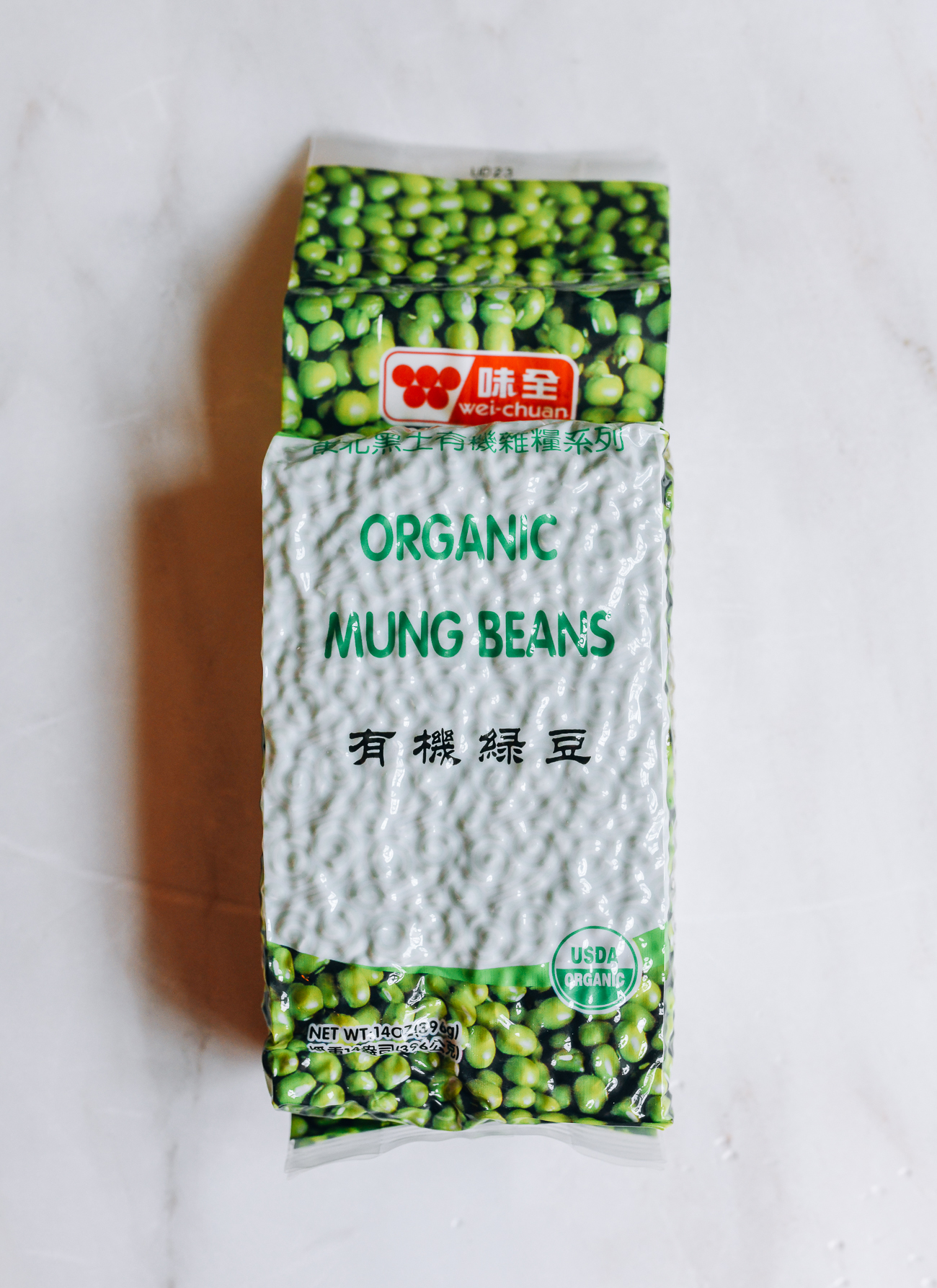
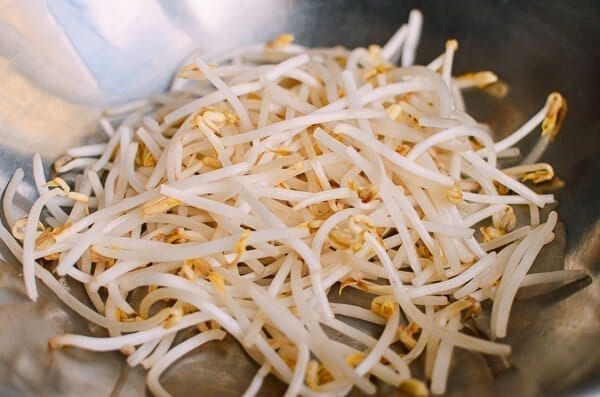
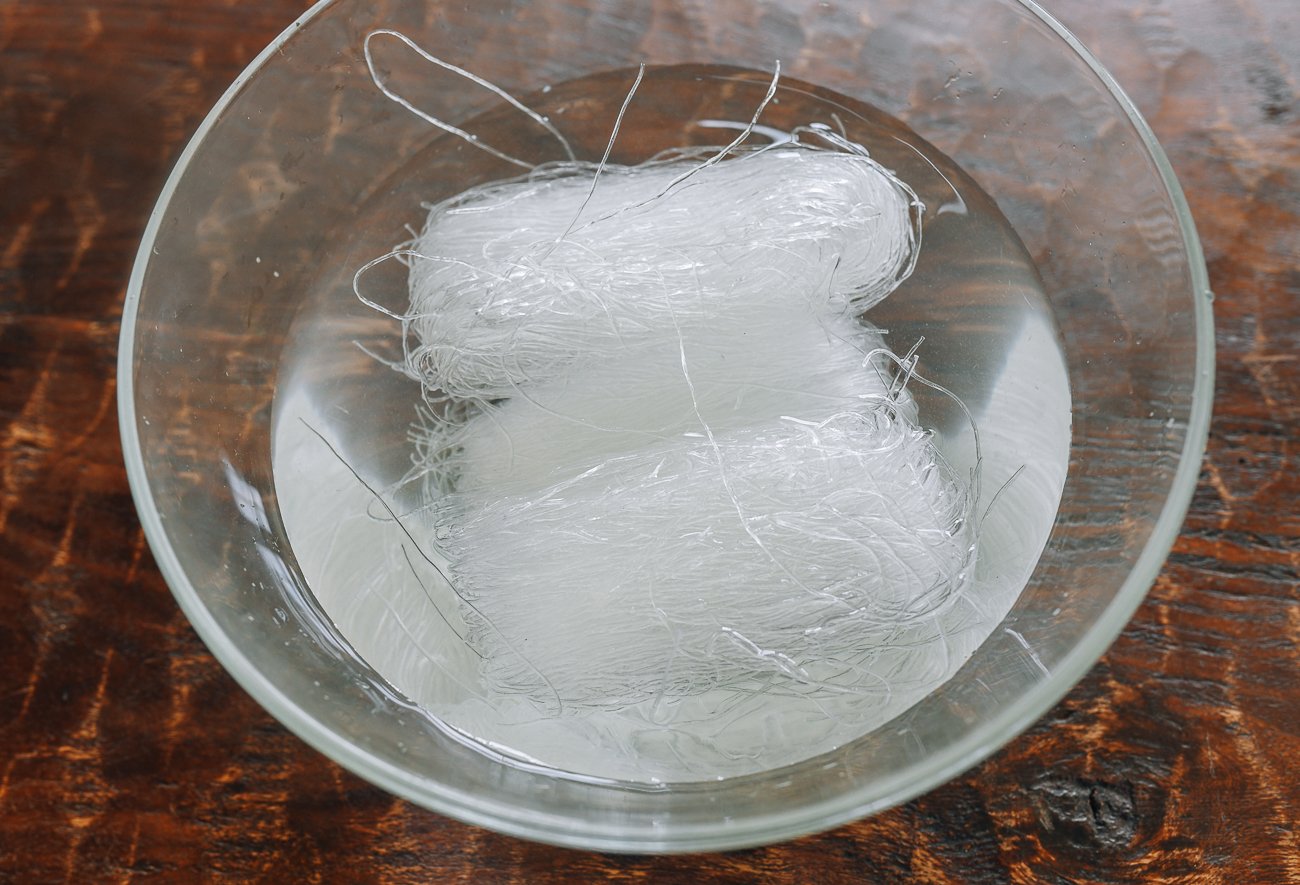
Here, I am using whole dried mung beans, which are green and comparable in size to dried adzuki beans (also known as red beans, which we use in sweet red bean soups and sweet red bean paste).
Like adzuki beans, mung beans are often used in desserts, like Mung Bean Popsicles and Bao Bing (Chinese Shaved Ice). You may also have seen sweet mung bean paste in Chinese pastries (very similar to red bean paste). The two beans are interchangeable in sweets.
This soup is also a dessert! However, it will effectively cool and rehydrate your body with or without the sugar.
A Summer Staple
Again, I can’t believe I haven’t blogged this sweet mung bean soup until now. It’s a must-have for every Chinese family during the summer.

There was no ice or refrigeration when I was growing up. Everyone depended on mung bean soup and fruits like watermelon and cucumber to cool down.
You may be wondering why a soup would be a summertime staple. The answer lies in the fact that mung beans, according to Traditional Chinese Medicine (TCM), have “cooling” or yin properties. They balance the internal heat (yang) in the body to cool it down. According to TCM, yin and yang balance is important to staying healthy.
The addition of dried lily bulbs also clears internal heat and calms the nerves (安神 – ānshén). They look kind of like thick white petals. Find them in Chinese markets near the dried beans and grains.
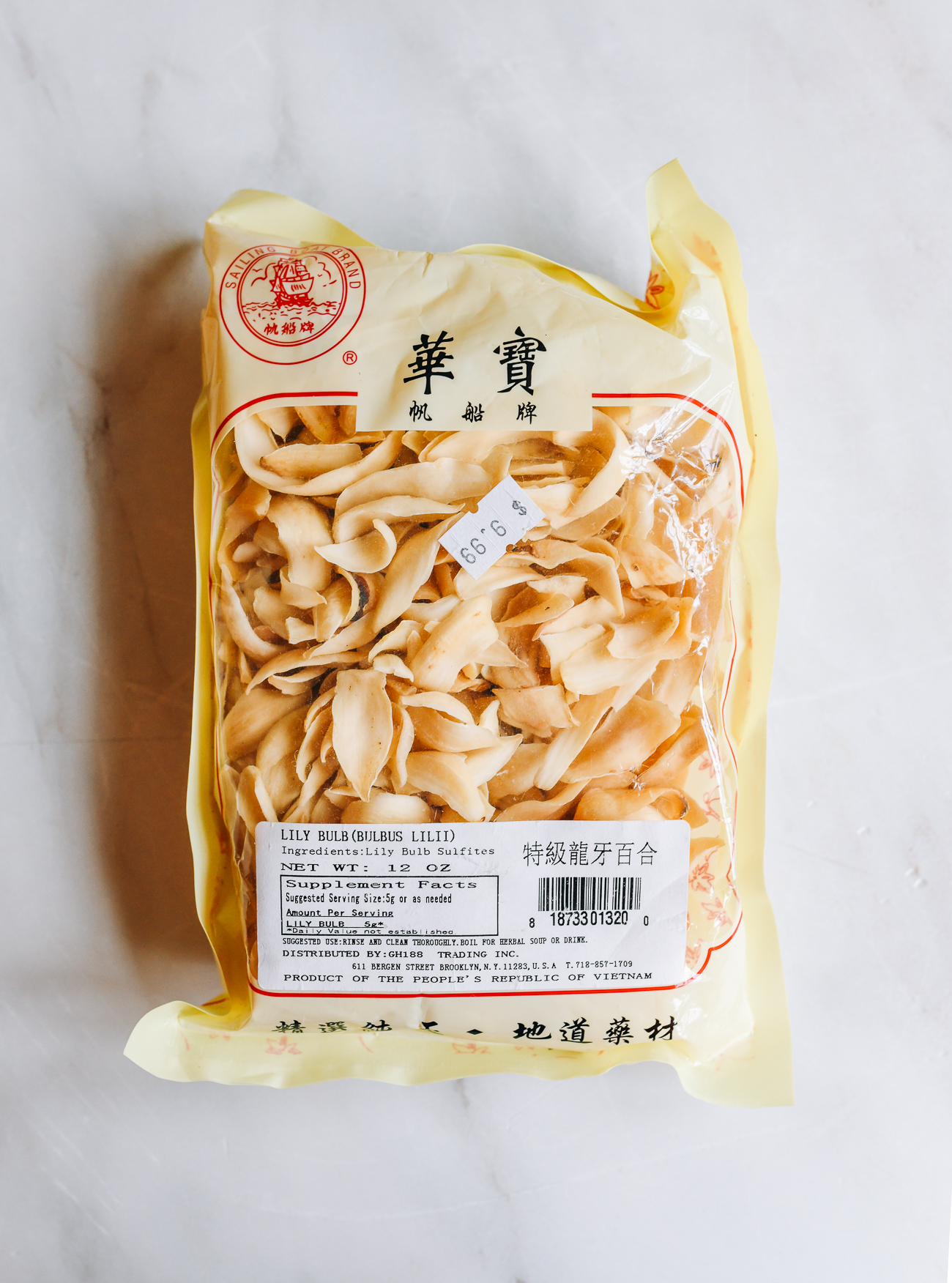
The liquid in the soup itself also helps to replenish your body with fluids after sweating. This is why this soup is more liquidy than your average red bean soup.
Additional Mung Bean Soup Ingredients
I also add 1-2 tablespoons of sweet glutinous rice to slightly thicken the soup and give it more body. I saw it on the internet somewhere—a cooking tip passed down by someone’s grandmother. How great is that? I adapted it in this recipe, so maybe this little trick will have a chance to live on in the kitchens of other home cooks.

You can also optionally add sago or mini tapioca pearls to replace the sweet rice, which will add a delightful texture in addition to the slight thickening factor. Sago is made from the sago palm, while tapioca is made with cassava, but the two can be used interchangeably.
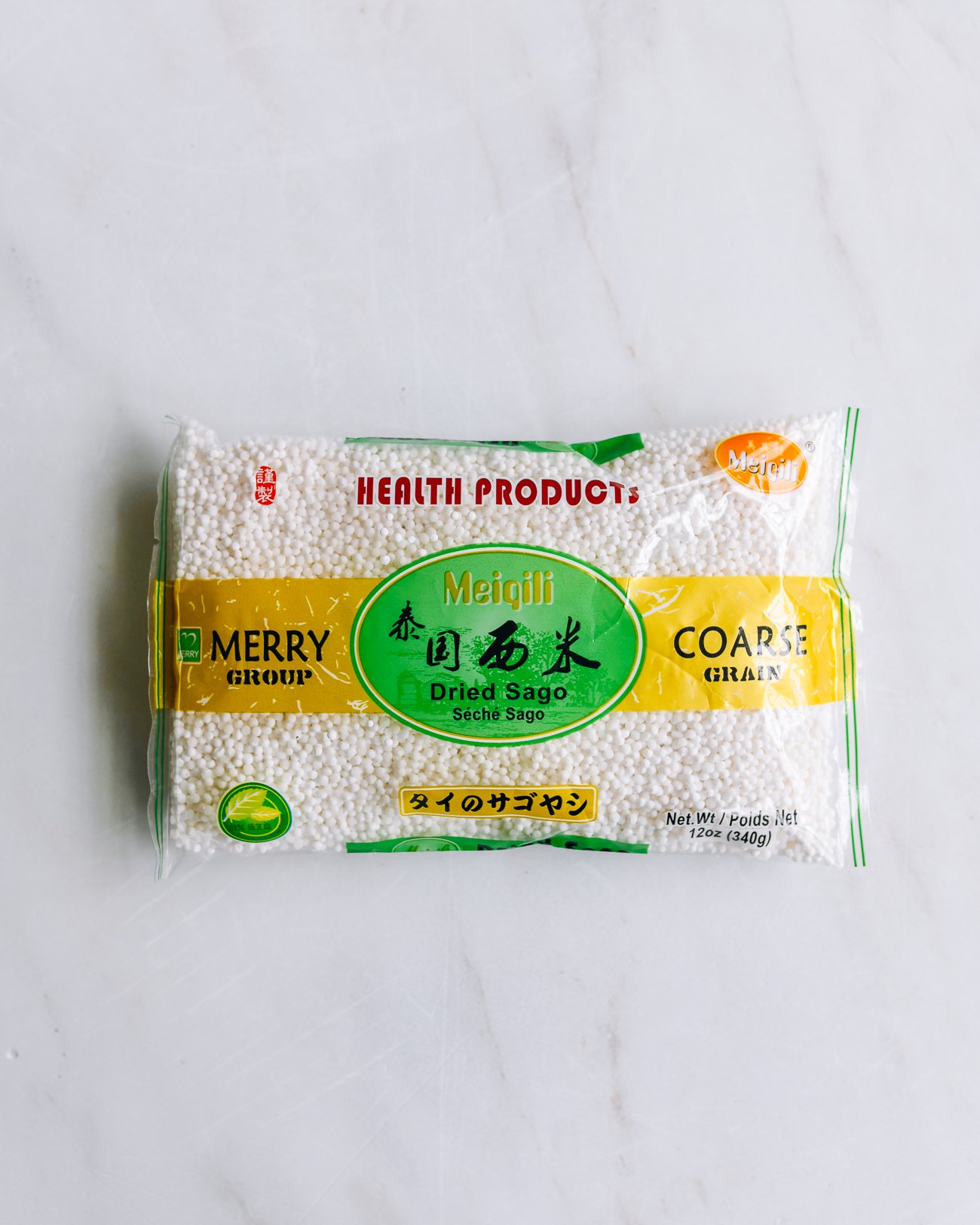
Do not use large tapioca pearls in this soup (like the ones in bubble tea). You want the very small ones that you use for tapioca pudding, mango sagoor Sarah’s taro tapioca dessert soup.
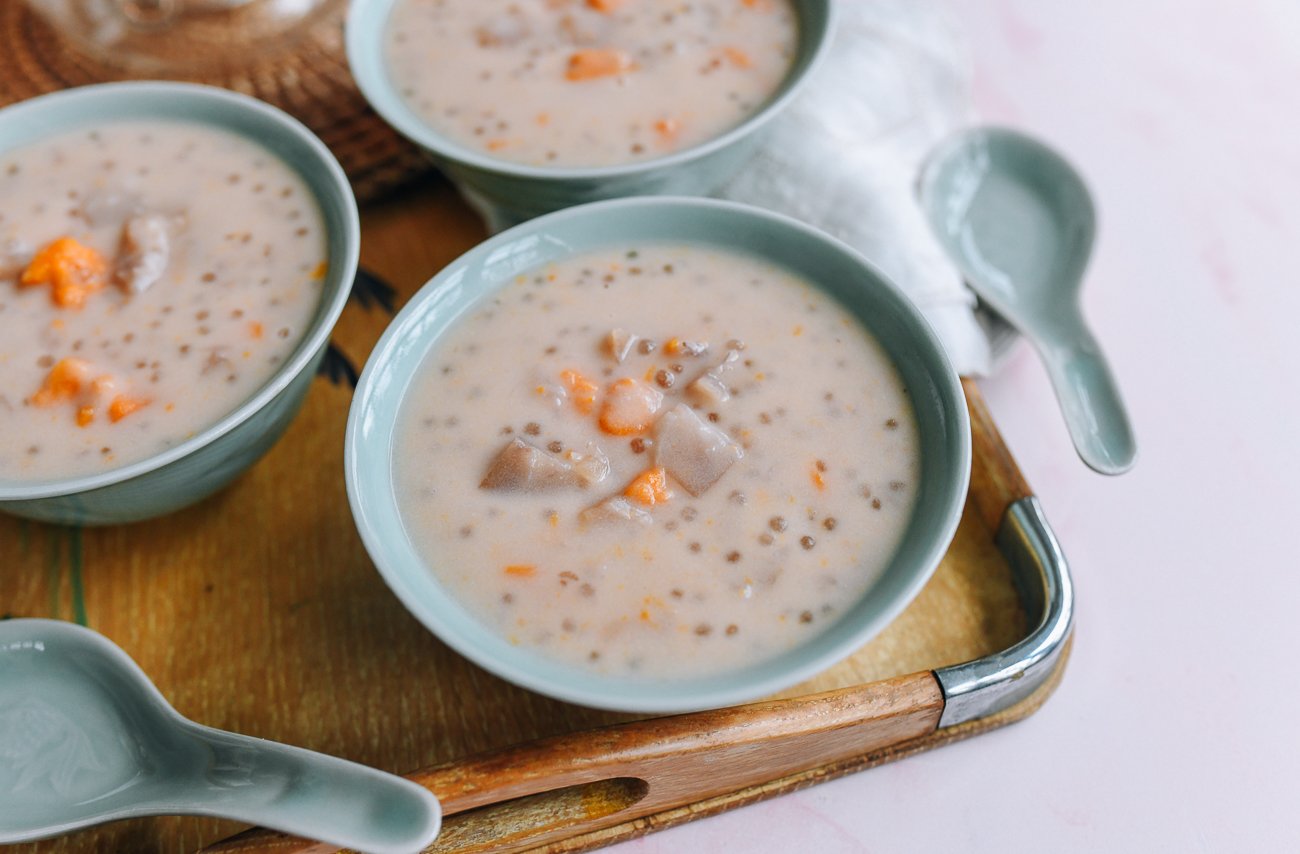
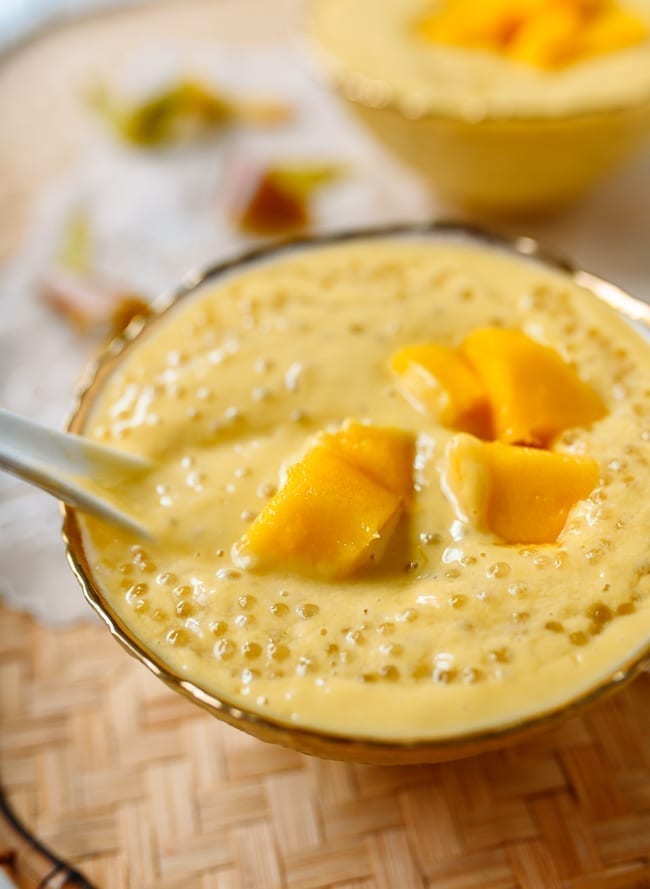
I like to sweeten the soup with honey to taste at the very end, though you can also add sugar or the sweetener of your choice.
How to Serve This Soup
Serve it warm or at room temperature. You can also serve it chilled if you don’t have a Chinese mom or TCM practitioner to answer to, haha! (I always tell my girls to avoid eating anything iced or too cold!)
But seriously, if you’re working outside in the heat and humidity, chilled mung bean soup can help you cool down. Just don’t eat it too fast to avoid a stomach ache!
Let’s get to the recipe.

Mung Bean Soup Recipe Instructions
First, rinse the beans, dried lily bulb pieces, and sweet rice under cold water. Add them to a large bowl, and cover with a few inches of water. Soak for at least 8 hours or overnight.
Drain the beans, lily bulb, and rice, and transfer to a large pot along with 8 cups of fresh water. Bring to a boil, cover, and simmer for about 1 hour, or until the beans are very soft and beginning to break down. Fresher beans cook faster, while older beans can take a while to cook through, so monitor the cooking process and adjust the cooking time accordingly.
If using sago or tapioca, add it to the soup after it’s been cooking for about 40 minutes. It will take about 20 minutes for them to cook through (they will be completely translucent). Some recipes recommend cooking the tapioca separately, but it works just fine to add them directly to the soup on the stove.
Tip!
The beans will continue to cook and soften even after you turn off the heat. If you’re making this soup ahead and don’t want your beans to break down too much, you can turn off the heat at the 50 minute mark, keeping the pot covered.
Finally, stir in your sweetener to taste. You can also refrain from adding sugar at this point, and each person can sweeten their individual bowls to taste.

instant pot instructions
You can also make this soup in the Instant Pot, which cuts out the pre-soaking step.
Just add the dried mung beans, dried lily bulb, sweet rice, and water to your instant pot. Seal the vent, cover, and cook on the bean/chili setting. Allow the pressure to release naturally.
If adding sago, cook it separately:
- Fill a medium pot about two thirds of the way with water, and bring it to a rolling boil.
- Stir in ½ cup sago or tapioca (DO NOT add it until the water is at a full boil!).
- Simmer for 20 minutes, or until the sago/tapioca is completely translucent. If after 20 minutes, the pearls still have a white center, turn off the heat, cover, and let sit in the hot water for another 5-10 minutes, or until they’re fully translucent.
- Drain through a fine-mesh strainer, rinse in cold water to cool, then soak in a bowl of cold water and set aside. When the soup has finished cooking, drain and add to the soup.
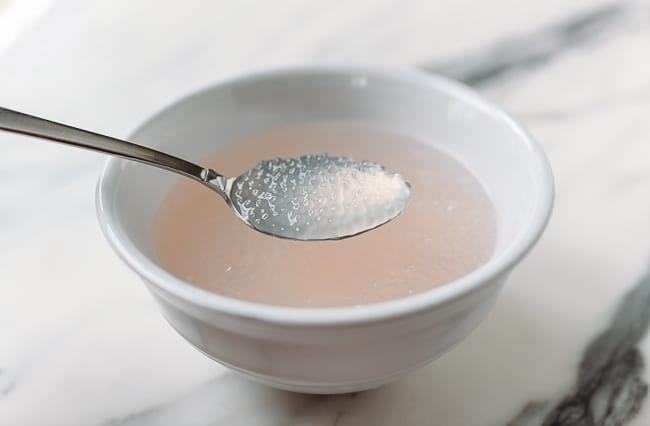
Mung Bean Soup
This lightly sweet mung bean soup recipe is a Chinese summer staple, meant to cool the body and enjoy as a dessert after your meal.

serves: 12
Prep: 10 minutes
Cook: 1 hour
Total: 1 hour 10 minutes
Instructions
-
First, rinse the beans, dried lily bulb pieces, and sweet rice under cold water. Add them to a large bowl, and cover with a few inches of water. Soak for at least 8 hours or overnight.
-
Drain the beans, lily bulb, and rice, and transfer to a large pot along with 8 cups of fresh water. Bring to a boil, cover, and simmer for about 1 hour, or until the beans are very soft and beginning to break down. Fresher beans cook faster, while older beans can take a while to cook through, so monitor the cooking process and adjust the cooking time accordingly.
-
If using sago or tapioca, add it to the soup after it’s been cooking for about 40 minutes. It will take about 20 minutes for them to cook through (they will be completely translucent).
-
Finally, stir in your sweetener to taste. You can also refrain from adding sugar at this point, and each person can sweeten their individual bowls to taste.
Tips & Notes:
If making ahead, turn off the heat at the 50 minute mark and keep the pot covered. This will prevent overcooking.
Prep time does not include 8 hours soaking time. You can also make this soup in the Instant Pot, which cuts out the pre-soaking step. Add dried mung beans, dried lily bulb, sweet rice, and water to your Instant Pot. Seal the vent, cover, and cook on the bean/chili setting. Allow the pressure to release naturally. If adding sago, cook it separately: Fill a medium pot about two thirds of the way with water, and bring it to a rolling boil. Stir in ½ cup sago or tapioca (DO NOT add it until the water is at a full boil!). Simmer for 20 minutes, or until the sago/tapioca is completely translucent. If after 20 minutes, the pearls still have a white center, turn off the heat, cover, and let sit in the hot water for another 5-10 minutes, or until they’re fully translucent. Drain through a fine-mesh strainer, rinse in cold water to cool, then soak in a bowl of cold water and set aside. When the soup has finished cooking, drain the pearls, and add to the soup.
nutrition facts
Calories: 69kcal (3%) Carbohydrates: 13g (4%) Protein: 4g (8%) Fat: 0.2g Saturated Fat: 0.1g (1%) Polyunsaturated Fat: 0.1g Monounsaturated Fat: 0.03g Sodium: 11mg Potassium: 217mg (6%) Fiber: 3g (12%) Sugar: 1g (1%) Vitamin A: 20IU Vitamin C: 1mg (1%) Calcium: 28mg (3%) Iron: 1mg (6%)

